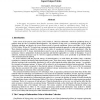Free Online Productivity Tools
i2Speak
i2Symbol
i2OCR
iTex2Img
iWeb2Print
iWeb2Shot
i2Type
iPdf2Split
iPdf2Merge
i2Bopomofo
i2Arabic
i2Style
i2Image
i2PDF
iLatex2Rtf
Sci2ools
119
click to vote
JCIT
2007
2007
Identification of Economic Cluster with Information Gain Method, based on Input-Output Tables
In this paper, we propose a more flexible “economic cluster identification” approach to analyzing the domestic I/O flows of intermediary goods and service that is based on information theory. Using an “information gain” estimation method, we make efficient use of inequality constraints about the structure of the domestic I/O flows. In particular, it allows us to impose a set of less restrictions than is possible under the traditional methods. The results show that there is a large degree of classification accuracy in South Korea.
Related Content
| Added | 15 Dec 2010 |
| Updated | 15 Dec 2010 |
| Type | Journal |
| Year | 2007 |
| Where | JCIT |
| Authors | Bae Sangbin, Moon Kyungil |
Comments (0)

